
According to Pew, three-in-ten U.S. adults say they have used a dating site or app. That number climbs to 53% for people under the age of 30. More and more people are turning to digital platforms to find love and companionship or simply to expand their social circles. However, as the popularity of online dating grows, so do the potential risks associated with it. From privacy concerns to identity theft, the digital dating world can be fraught with peril if you’re not careful. But fear not, by following a few simple guidelines, you can navigate the online dating scene safely and securely.
This article is for you or anyone you know who may be hopping onto an online dating app like Match, Bumble, Plenty of Fish, eHarmony, Tinder, or OkCupid. Think of it as an advice column of a different sort, where we talk about dating in light of your online privacy and safety.
For starters, we have a couple of previous blogs that offer sound advice about online dating. The first covers ways you can protect your privacy when you’re using online dating apps, which starts with picking a dating app that has a good reputation. The second rounds out the topic with further online dating advice for adults and teens alike. Give them a look!
It starts with basic hygiene. Digital hygiene, that is. Before you dive into a dating app, ensure that your device (and all your connected devices while you’re at it) has a comprehensive security solution in place. As you surf, chat, and meet up online, you’ll want to know that you’re protected against malware, viruses, phishing attacks, sketchy links, and so forth. Other features will come in handy (and be necessary as well), like ones that help you manage your passwords, protect your identity, safeguard your privacy, and more—all of which we’ll talk about in a bit.
Picking the right app is like picking the right date. From a security standpoint, these apps are the keepers of highly personal information about you, so you’ll want to know how they handle data, what privacy protections are in place, what information they gather when you first sign up, and what they continue to gather as you use the app. Do your research. Read up on their privacy policies. See what other people have to say about their experiences. And get a sense of what the app is all about. What’s its approach to dating? What kind of relationships are they focusing on? Make sure all of it feels right to you.
Only give the app the information that’s absolutely necessary to sign up. Dating apps ask questions so that they can help you find an ideal match, yet only share what you feel comfortable sharing. This is true from a personal standpoint, but it’s true from a security standpoint too. Anything you share along those lines could be at risk of a hack or a breach, the likes of which were reported by Wired and Forbes last year. If your info is compromised, it could lead to anywhere from identity theft to harassment, so when you use a dating app, keep the sharing to a minimum—and keep your eyes peeled for any suspicious activity across your social media, online accounts, and even your finances.
Another password to remember! That’s just what you need, right? Right! It absolutely is, and a strong one is vital. You can create one and manage all of your passwords with McAfee+’s password manager. It’ll encrypt your passwords and use multi-factor authentication, which offers even further protection from hacks and attacks on your account.
You can help keep your chats more private, and just about anything else you’re doing online, by using a VPN (virtual private network). For example, our VPN uses bank-level encryption to keep your personal data and activities private from hackers. And it’ll hide other information associated with your dating account while you’re online, like personal details, credit card numbers, and so forth. Given the security risks we’ve talked about so far, you’ll want to look into a VPN.
If you’re not using a VPN on your device, don’t use your dating app on public Wi-Fi. The issue is this: plenty of public Wi-Fi hotspots aren’t secure. Someone else on the network could easily intercept the information you send over it, including your passwords, any photos you share, and any chats you have. In other words, using public Wi-Fi without protection is like opening a door that leads right to you and your most personal data. This applies to everything on public Wi-Fi, not just dating apps. If you use public Wi-Fi at all, you really should use a VPN.
In the ever-evolving landscape of online dating, safeguarding your privacy and security is paramount. By implementing strategies such as using strong passwords, employing a reliable VPN, and exercising caution on public Wi-Fi, you can navigate the digital dating sphere with confidence. Remember, your safety and privacy are non-negotiable priorities in the pursuit of love and companionship online.
The post How to Safely Date Online appeared first on McAfee Blog.

For years now, the popularity of online dating has been on the rise—and so have the number of online romance scams that leave people with broken hearts and empty wallets.
In a recent CBS News story, one Texan woman was scammed out of $3,200 by a scammer claiming to be a German Cardiologist. After months of exchanging messages and claiming to be in love with her, he said that he’d been robbed while on a business trip in Nigeria and needed her help.
According to the U.S. Federal Trade Commission (FTC), the reported cost of online romance scams was $1.14 billion in 2023.
Dating and romance scams aren’t limited to online dating apps and sites, they’ll happen on social media and in online games as well. However, the FTC reports that the scam usually starts the same way, typically through an unexpected friend request or a message that comes out of the blue.
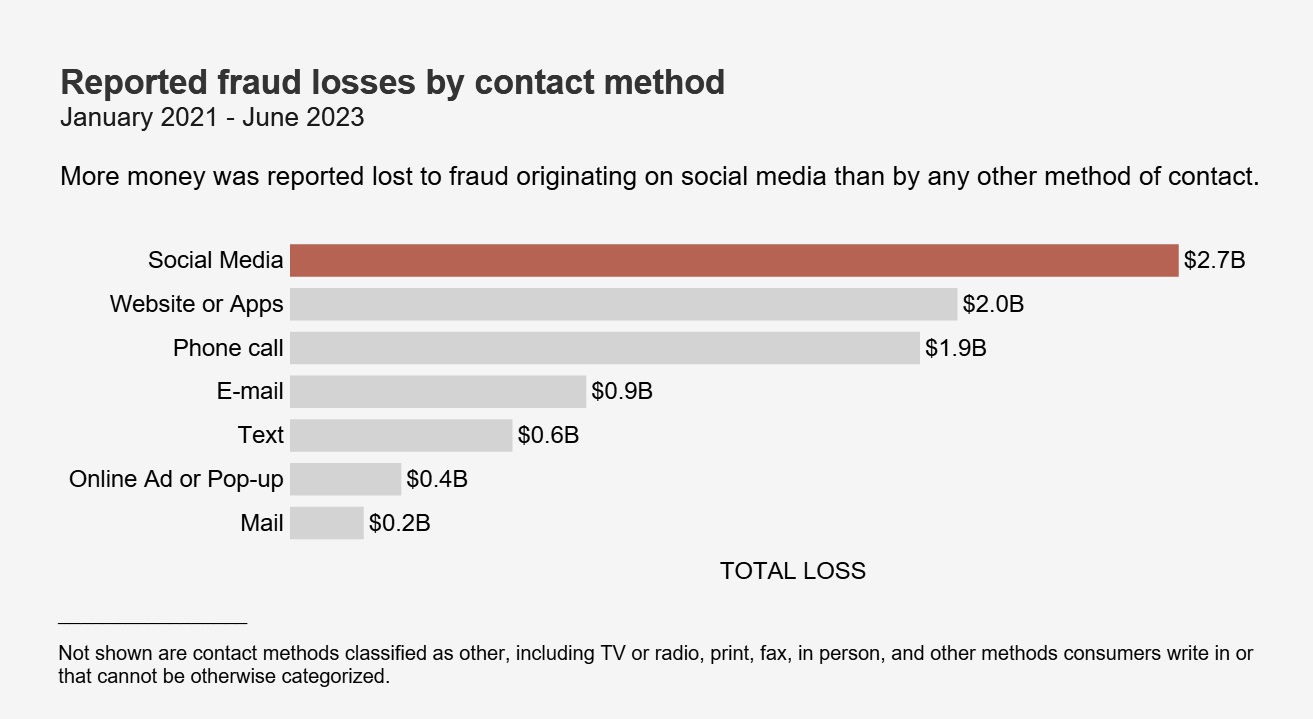
With the phony relationship established, the scammer starts asking for money. The FTC reports that they’ll ask for money for several bogus reasons, usually revolving around some sort of hardship where they need a “little help” so that they can pay:
The list goes on, yet that’s the general gist. Scammers often employ a story with an intriguing complication that seems just reasonable enough, one where the romance scammer makes it sound like they could really use the victim’s financial help.
People who have filed fraud reports say they’ve paid their scammer in a few typical ways.
One is by wiring money, often through a wire transfer company. The benefit of this route, for the scammer anyway, is that this is as good as forking over cash. Once it’s gone, it’s gone. The victim lacks the protections they have with other payment forms, such as a credit card that allows the holder to cancel or contest a charge.
Another way is through gift cards. Scammers of all stripes, not just romance scammers, like these because they effectively work like cash, whether it’s a gift card for a major online retailer or a chain of brick-and-mortar stores. Like a wire transfer, once that gift card is handed over, the money on it is highly difficult to recover, if at all.
One more common payment is through reloadable debit cards. A scammer may make an initial request for such a card and then make several follow-on requests to load it up again.
In all, a romance scammer will typically look for the easiest payment method that’s the most difficult to contest or reimburse, leaving the victim in a financial lurch once the scam ends.
When it comes to meeting new people online, the FTC suggests the following:
Scammers, although arguably heartless, are still human. They make mistakes. The stories they concoct are just that. Stories. They may jumble their details, get their times and dates all wrong, or simply get caught in an apparent lie. Also, keep in mind that some scammers may be working with several victims at once, which is yet another opportunity for them to get confused and slip up.
As mentioned above, some romance scammers troll social media and reach out through direct messages or friend requests. With that, there are three things you can do to cut down your chances of getting caught up with a scammer:
Social media platforms like Facebook, Instagram, and others give you the option of making your profile and posts visible to friends only. Choosing this setting keeps the broader internet from seeing what you’re doing, saying, and posting, which can help protect your privacy and give a romance scammer less information to exploit.
Be critical of the invitations you receive. Out-and-out strangers could be more than a romance scammer, they could be a fake account designed to gather information on users for purposes of cybercrime, or they can be an account designed to spread false information. There are plenty of them too. In fact, in Q4 of 2023 alone, Facebook took action on 693 million fake accounts. Reject such requests.
Online protection software like ours can help you spot fakes and scams. Features like Text Scam Detector use advanced AI to detect scam links in texts, email, and social media messages before you click. Our Personal Data Cleanup can keep you safer still by removing your personal info from sketchy data broker sites — places where scammers go to harvest useful info on their victims. And if the unfortunate happens, we offer $2 million in identity theft coverage and identity restoration support.
If you suspect that you’re being scammed, put an end to the relationship and report it, as difficult as that may feel.
Notify the FTC at ReportFraud.ftc.gov for support and next steps to help you recover financially as much as possible. Likewise, notify the social media site, app, or service where the scam occurred as well. In some cases, you may want to file a police report, which we cover in our broader article on identity theft and fraud.
If you sent funds via a gift card, the FTC suggests filing a claim with the company as soon as possible. They offer further advice on filing a claim here, along with a list of contact numbers for gift card brands that scammers commonly use.
Lastly, go easy on yourself. If you find yourself a victim of online dating or romance fraud, know that you won’t be the first or last person to be taken advantage of this way. By reporting your case, you in fact may help others from falling victim too.
The post How to Spot Dating Scams appeared first on McAfee Blog.
If you live in the United States, the data broker Radaris likely knows a great deal about you, and they are happy to sell what they know to anyone. But how much do we know about Radaris? Publicly available data indicates that in addition to running a dizzying array of people-search websites, the co-founders of Radaris operate multiple Russian-language dating services and affiliate programs. It also appears many of their businesses have ties to a California marketing firm that works with a Russian state-run media conglomerate currently sanctioned by the U.S. government.
Formed in 2009, Radaris is a vast people-search network for finding data on individuals, properties, phone numbers, businesses and addresses. Search for any American’s name in Google and the chances are excellent that a listing for them at Radaris.com will show up prominently in the results.
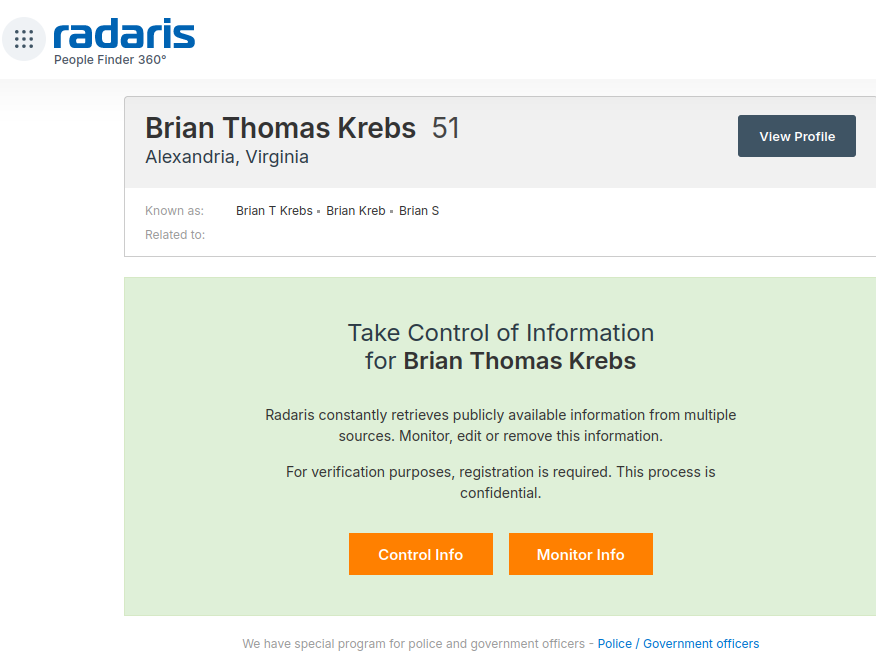
Radaris reports typically bundle a substantial amount of data scraped from public and court documents, including any current or previous addresses and phone numbers, known email addresses and registered domain names. The reports also list address and phone records for the target’s known relatives and associates. Such information could be useful if you were trying to determine the maiden name of someone’s mother, or successfully answer a range of other knowledge-based authentication questions.
Currently, consumer reports advertised for sale at Radaris.com are being fulfilled by a different people-search company called TruthFinder. But Radaris also operates a number of other people-search properties — like Centeda.com — that sell consumer reports directly and behave almost identically to TruthFinder: That is, reel the visitor in with promises of detailed background reports on people, and then charge a $34.99 monthly subscription fee just to view the results.
The Better Business Bureau (BBB) assigns Radaris a rating of “F” for consistently ignoring consumers seeking to have their information removed from Radaris’ various online properties. Of the 159 complaints detailed there in the last year, several were from people who had used third-party identity protection services to have their information removed from Radaris, only to receive a notice a few months later that their Radaris record had been restored.
What’s more, Radaris’ automated process for requesting the removal of your information requires signing up for an account, potentially providing more information about yourself that the company didn’t already have (see screenshot above).
Radaris has not responded to requests for comment.
Radaris, TruthFinder and others like them all force users to agree that their reports will not be used to evaluate someone’s eligibility for credit, or a new apartment or job. This language is so prominent in people-search reports because selling reports for those purposes would classify these firms as consumer reporting agencies (CRAs) and expose them to regulations under the Fair Credit Reporting Act (FCRA).
These data brokers do not want to be treated as CRAs, and for this reason their people search reports typically do not include detailed credit histories, financial information, or full Social Security Numbers (Radaris reports include the first six digits of one’s SSN).
But in September 2023, the U.S. Federal Trade Commission found that TruthFinder and another people-search service Instant Checkmate were trying to have it both ways. The FTC levied a $5.8 million penalty against the companies for allegedly acting as CRAs because they assembled and compiled information on consumers into background reports that were marketed and sold for employment and tenant screening purposes.
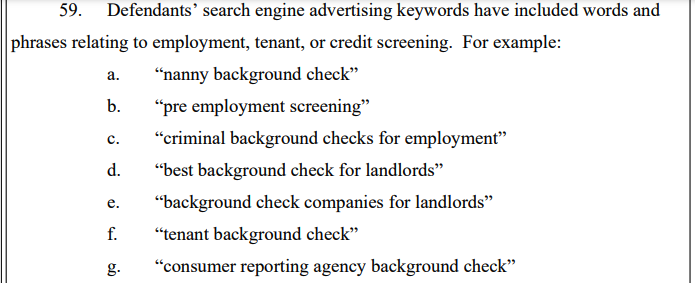
An excerpt from the FTC’s complaint against TruthFinder and Instant Checkmate.
The FTC also found TruthFinder and Instant Checkmate deceived users about background report accuracy. The FTC alleges these companies made millions from their monthly subscriptions using push notifications and marketing emails that claimed that the subject of a background report had a criminal or arrest record, when the record was merely a traffic ticket.
“All the while, the companies touted the accuracy of their reports in online ads and other promotional materials, claiming that their reports contain “the MOST ACCURATE information available to the public,” the FTC noted. The FTC says, however, that all the information used in their background reports is obtained from third parties that expressly disclaim that the information is accurate, and that TruthFinder and Instant Checkmate take no steps to verify the accuracy of the information.
The FTC said both companies deceived customers by providing “Remove” and “Flag as Inaccurate” buttons that did not work as advertised. Rather, the “Remove” button removed the disputed information only from the report as displayed to that customer; however, the same item of information remained visible to other customers who searched for the same person.
The FTC also said that when a customer flagged an item in the background report as inaccurate, the companies never took any steps to investigate those claims, to modify the reports, or to flag to other customers that the information had been disputed.
According to Radaris’ profile at the investor website Pitchbook.com, the company’s founder and “co-chief executive officer” is a Massachusetts resident named Gary Norden, also known as Gary Nard.
An analysis of email addresses known to have been used by Mr. Norden shows he is a native Russian man whose real name is Igor Lybarsky (also spelled Lubarsky). Igor’s brother Dmitry, who goes by “Dan,” appears to be the other co-CEO of Radaris. Dmitry Lybarsky’s Facebook/Meta account says he was born in March 1963.

The Lybarsky brothers Dmitry or “Dan” (left) and Igor a.k.a. “Gary,” in an undated photo.
Indirectly or directly, the Lybarskys own multiple properties in both Sherborn and Wellesley, Mass. However, the Radaris website is operated by an offshore entity called Bitseller Expert Ltd, which is incorporated in Cyprus. Neither Lybarsky brother responded to requests for comment.
A review of the domain names registered by Gary Norden shows that beginning in the early 2000s, he and Dan built an e-commerce empire by marketing prepaid calling cards and VOIP services to Russian expatriates who are living in the United States and seeking an affordable way to stay in touch with loved ones back home.
In 2012, the main company in charge of providing those calling services — Wellesley Hills, Mass-based Unipoint Technology Inc. — was fined $179,000 by the U.S. Federal Communications Commission, which said Unipoint never applied for a license to provide international telecommunications services.
DomainTools.com shows the email address gnard@unipointtech.com is tied to 137 domains, including radaris.com. DomainTools also shows that the email addresses used by Gary Norden for more than two decades — epop@comby.com, gary@barksy.com and gary1@eprofit.com, among others — appear in WHOIS registration records for an entire fleet of people-search websites, including: centeda.com, virtory.com, clubset.com, kworld.com, newenglandfacts.com, and pub360.com.
Still more people-search platforms tied to Gary Norden– like publicreports.com and arrestfacts.com — currently funnel interested customers to third-party search companies, such as TruthFinder and PersonTrust.com.
The email addresses used by Gary Nard/Gary Norden are also connected to a slew of data broker websites that sell reports on businesses, real estate holdings, and professionals, including bizstanding.com, homemetry.com, trustoria.com, homeflock.com, rehold.com, difive.com and projectlab.com.
Domain records indicate that Gary and Dan for many years operated a now-defunct pay-per-click affiliate advertising network called affiliate.ru. That entity used domain name servers tied to the aforementioned domains comby.com and eprofit.com, as did radaris.ru.
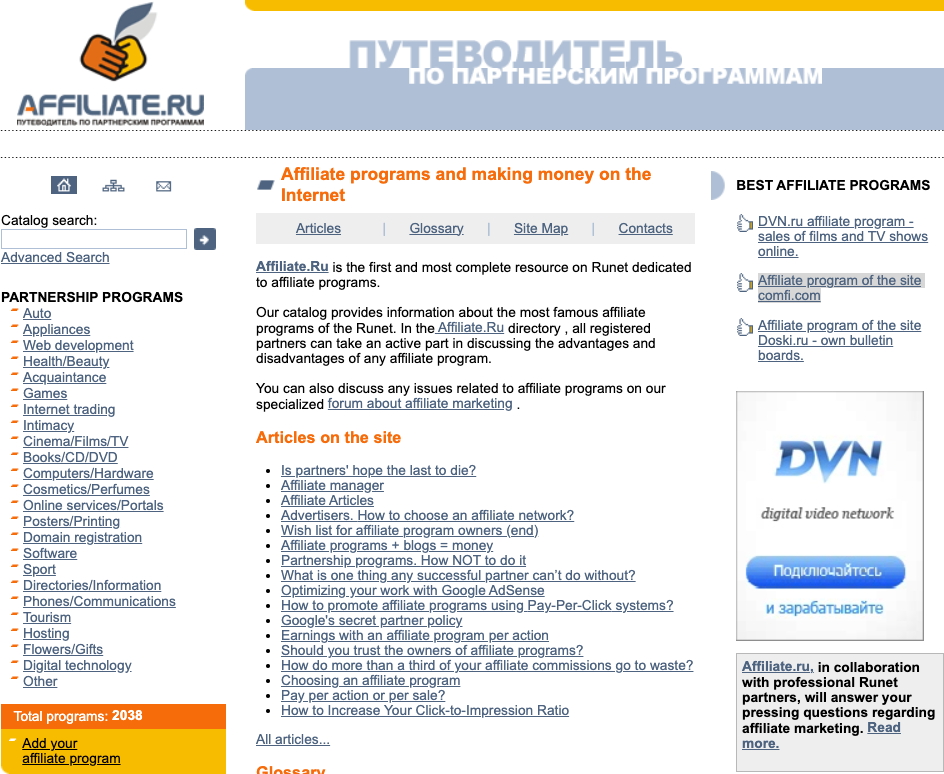
A machine-translated version of Affiliate.ru, a Russian-language site that advertised hundreds of money making affiliate programs, including the Comfi.com prepaid calling card affiliate.
Comby.com used to be a Russian language social media network that looked a great deal like Facebook. The domain now forwards visitors to Privet.ru (“hello” in Russian), a dating site that claims to have 5 million users. Privet.ru says it belongs to a company called Dating Factory, which lists offices in Switzerland. Privet.ru uses the Gary Norden domain eprofit.com for its domain name servers.
Dating Factory’s website says it sells “powerful dating technology” to help customers create unique or niche dating websites. A review of the sample images available on the Dating Factory homepage suggests the term “dating” in this context refers to adult websites. Dating Factory also operates a community called FacebookOfSex, as well as the domain analslappers.com.
Email addresses for the Comby and Eprofit domains indicate Gary Norden operates an entity in Wellesley Hills, Mass. called RussianAmerican Holding Inc. (russianamerica.com). This organization is listed as the owner of the domain newyork.ru, which is a site dedicated to orienting newcomers from Russia to the Big Apple.
Newyork.ru’s terms of service refer to an international calling card company called ComFi Inc. (comfi.com) and list an address as PO Box 81362 Wellesley Hills, Ma. Other sites that include this address are russianamerica.com, russianboston.com, russianchicago.com, russianla.com, russiansanfran.com, russianmiami.com, russiancleveland.com and russianseattle.com (currently offline).
ComFi is tied to Comfibook.com, which was a search aggregator website that collected and published data from many online and offline sources, including phone directories, social networks, online photo albums, and public records.
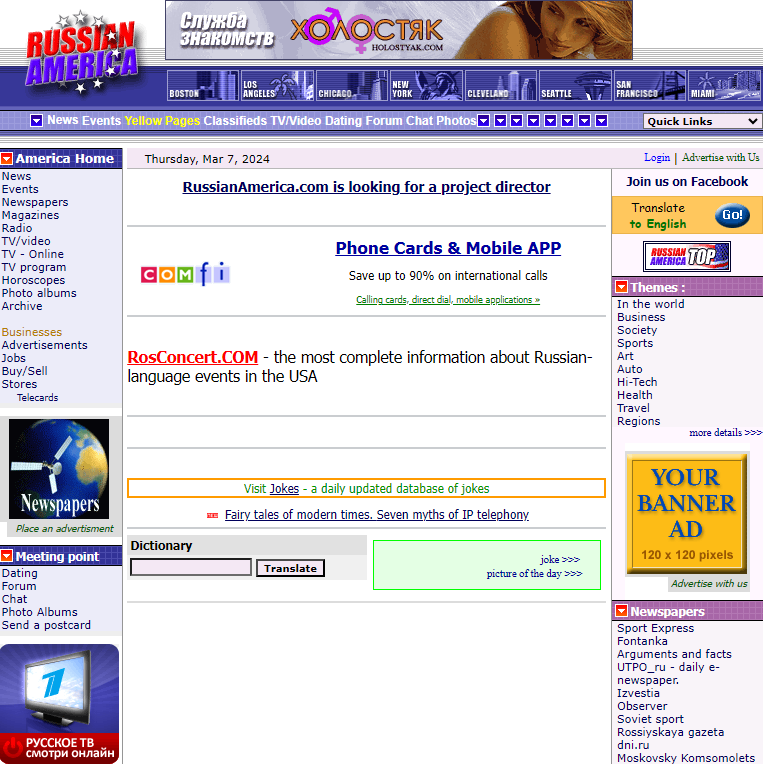
The current website for russianamerica.com. Note the ad in the bottom left corner of this image for Channel One, a Russian state-owned media firm that is currently sanctioned by the U.S. government.
Many of the U.S. city-specific online properties apparently tied to Gary Norden include phone numbers on their contact pages for a pair of Russian media and advertising firms based in southern California. The phone number 323-874-8211 appears on the websites russianla.com, russiasanfran.com, and rosconcert.com, which sells tickets to theater events performed in Russian.
Historic domain registration records from DomainTools show rosconcert.com was registered in 2003 to Unipoint Technologies — the same company fined by the FCC for not having a license. Rosconcert.com also lists the phone number 818-377-2101.
A phone number just a few digits away — 323-874-8205 — appears as a point of contact on newyork.ru, russianmiami.com, russiancleveland.com, and russianchicago.com. A search in Google shows this 82xx number range — and the 818-377-2101 number — belong to two different entities at the same UPS Store mailbox in Tarzana, Calif: American Russian Media Inc. (armediacorp.com), and Lamedia.biz.
Armediacorp.com is the home of FACT Magazine, a glossy Russian-language publication put out jointly by the American-Russian Business Council, the Hollywood Chamber of Commerce, and the West Hollywood Chamber of Commerce.
Lamedia.biz says it is an international media organization with more than 25 years of experience within the Russian-speaking community on the West Coast. The site advertises FACT Magazine and the Russian state-owned media outlet Channel One. Clicking the Channel One link on the homepage shows Lamedia.biz offers to submit advertising spots that can be shown to Channel One viewers. The price for a basic ad is listed at $500.
In May 2022, the U.S. government levied financial sanctions against Channel One that bar US companies or citizens from doing business with the company.

The website of lamedia.biz offers to sell advertising on two Russian state-owned media firms currently sanctioned by the U.S. government.
In 2014, a group of people sued Radaris in a class-action lawsuit claiming the company’s practices violated the Fair Credit Reporting Act. Court records indicate the defendants never showed up in court to dispute the claims, and as a result the judge eventually awarded the plaintiffs a default judgement and ordered the company to pay $7.5 million.
But the plaintiffs in that civil case had a difficult time collecting on the court’s ruling. In response, the court ordered the radaris.com domain name (~9.4M monthly visitors) to be handed over to the plaintiffs.
However, in 2018 Radaris was able to reclaim their domain on a technicality. Attorneys for the company argued that their clients were never named as defendants in the original lawsuit, and so their domain could not legally be taken away from them in a civil judgment.
“Because our clients were never named as parties to the litigation, and were never served in the litigation, the taking of their property without due process is a violation of their rights,” Radaris’ attorneys argued.
In October 2023, an Illinois resident filed a class-action lawsuit against Radaris for allegedly using people’s names for commercial purposes, in violation of the Illinois Right of Publicity Act.
On Feb. 8, 2024, a company called Atlas Data Privacy Corp. sued Radaris LLC for allegedly violating “Daniel’s Law,” a statute that allows New Jersey law enforcement, government personnel, judges and their families to have their information completely removed from people-search services and commercial data brokers. Atlas has filed at least 140 similar Daniel’s Law complaints against data brokers recently.
Daniel’s Law was enacted in response to the death of 20-year-old Daniel Anderl, who was killed in a violent attack targeting a federal judge (his mother). In July 2020, a disgruntled attorney who had appeared before U.S. District Judge Esther Salas disguised himself as a Fedex driver, went to her home and shot and killed her son (the judge was unharmed and the assailant killed himself).
Earlier this month, The Record reported on Atlas Data Privacy’s lawsuit against LexisNexis Risk Data Management, in which the plaintiffs representing thousands of law enforcement personnel in New Jersey alleged that after they asked for their information to remain private, the data broker retaliated against them by freezing their credit and falsely reporting them as identity theft victims.
Another data broker sued by Atlas Data Privacy — pogodata.com — announced on Mar. 1 that it was likely shutting down because of the lawsuit.
“The matter is far from resolved but your response motivates us to try to bring back most of the names while preserving redaction of the 17,000 or so clients of the redaction company,” the company wrote. “While little consolation, we are not alone in the suit – the privacy company sued 140 property-data sites at the same time as PogoData.”
Atlas says their goal is convince more states to pass similar laws, and to extend those protections to other groups such as teachers, healthcare personnel and social workers. Meanwhile, media law experts say they’re concerned that enacting Daniel’s Law in other states would limit the ability of journalists to hold public officials accountable, and allow authorities to pursue criminals charges against media outlets that publish the same type of public and governments records that fuel the people-search industry.
There are some pending changes to the US legal and regulatory landscape that could soon reshape large swaths of the data broker industry. But experts say it is unlikely that any of these changes will affect people-search companies like Radaris.
On Feb. 28, 2024, the White House issued an executive order that directs the U.S. Department of Justice (DOJ) to create regulations that would prevent data brokers from selling or transferring abroad certain data types deemed too sensitive, including genomic and biometric data, geolocation and financial data, as well as other as-yet unspecified personal identifiers. The DOJ this week published a list of more than 100 questions it is seeking answers to regarding the data broker industry.
In August 2023, the Consumer Financial Protection Bureau (CFPB) announced it was undertaking new rulemaking related to data brokers.
Justin Sherman, an adjunct professor at Duke University, said neither the CFPB nor White House rulemaking will likely address people-search brokers because these companies typically get their information by scouring federal, state and local government records. Those government files include voting registries, property filings, marriage certificates, motor vehicle records, criminal records, court documents, death records, professional licenses, bankruptcy filings, and more.
“These dossiers contain everything from individuals’ names, addresses, and family information to data about finances, criminal justice system history, and home and vehicle purchases,” Sherman wrote in an October 2023 article for Lawfare. “People search websites’ business pitch boils down to the fact that they have done the work of compiling data, digitizing it, and linking it to specific people so that it can be searched online.”
Sherman said while there are ongoing debates about whether people search data brokers have legal responsibilities to the people about whom they gather and sell data, the sources of this information — public records — are completely carved out from every single state consumer privacy law.
“Consumer privacy laws in California, Colorado, Connecticut, Delaware, Indiana, Iowa, Montana, Oregon, Tennessee, Texas, Utah, and Virginia all contain highly similar or completely identical carve-outs for ‘publicly available information’ or government records,” Sherman wrote. “Tennessee’s consumer data privacy law, for example, stipulates that “personal information,” a cornerstone of the legislation, does not include ‘publicly available information,’ defined as:
“…information that is lawfully made available through federal, state, or local government records, or information that a business has a reasonable basis to believe is lawfully made available to the general public through widely distributed media, by the consumer, or by a person to whom the consumer has disclosed the information, unless the consumer has restricted the information to a specific audience.”
Sherman said this is the same language as the carve-out in the California privacy regime, which is often held up as the national leader in state privacy regulations. He said with a limited set of exceptions for survivors of stalking and domestic violence, even under California’s newly passed Delete Act — which creates a centralized mechanism for consumers to ask some third-party data brokers to delete their information — consumers across the board cannot exercise these rights when it comes to data scraped from property filings, marriage certificates, and public court documents, for example.
“With some very narrow exceptions, it’s either extremely difficult or impossible to compel these companies to remove your information from their sites,” Sherman told KrebsOnSecurity. “Even in states like California, every single consumer privacy law in the country completely exempts publicly available information.”
Below is a mind map that helped KrebsOnSecurity track relationships between and among the various organizations named in the story above: